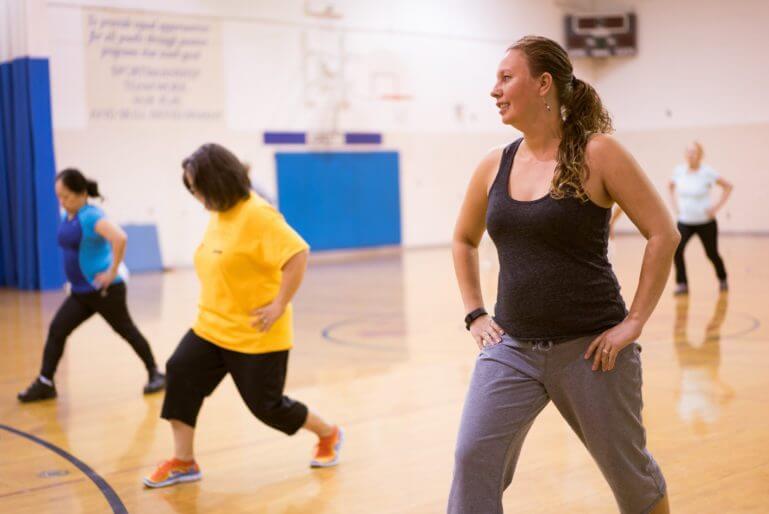Chronic Pain Rehabilitation
Find your path forward after chronic pain.
Chronic Pain, often defined as inhibiting pain that lingers for longer than six months, is an intrusive, life-altering condition. Not only a contributor to stress, fatigue, and depression, chronic pain frequently acts as a barrier between an individual, their personal wellness, and the regular roles and responsibilities that add meaning to everyday life.
QLI’s Chronic Pain Rehabilitation program utilizes a unique approach that threads medical, physical, and psychology expertise together to address pain at its physiological or neurological source—but in addition, our program provides integrated coaching and individualized, functional strategy to empower clients toward lifelong activity.
Using a unique inpatient structure, QLI’s program places clients within an eight-to-twelve-week program—noticeably longer than most pain management programs. Our clinical teams utilize this time to isolate causes and triggers of pain, emphasize strength and conditioning training, build healthy psychosocial routines, prioritize social reengagement, and establish effective mechanisms that allow each client to manage chronic pain with independence.
At QLI, opioid weaning is a critical conversation. Many pain management programs regard opioid abstinence as a successful conclusion to treatment. Here, it is only the starting point. Our teams are fully committed to providing the support necessary to help clients complete a healthy detoxification process, and we believe clients benefit most from the program’s resources only after opioids have been removed from the larger pain rehabilitation framework.
Finally, QLI’s program uses each client’s individual goals as the foundation of our discharge planning. From the first day on campus, our clinical teams collaborate with the client and the integral parts of the client’s support system, not only reintegrating individuals back into major life roles—like parenting and career pathways—but envisioning a daily routine of structure and success.
We understand the complexities of Chronic Pain. As a result, we provide an unprecedented level of support to help individuals overcome the barriers pain creates. By blending medical expertise, physical and occupational therapy specialization, and neuropsychologist oversight, QLI’s Chronic Pain Rehabilitation program breaks down those barriers—helping clients lead a healthier, more active, more engaged life.
Tri-Dimensional Rehabilitation®
Medical Management
QLI’s pain rehabilitation team works alongside our medical director and the client to develop a safe opioid tapering plan that is carefully monitored by 24-hour nursing support. Our clients consistently report decreased levels of pain with increased levels of activity after long-term opioids have been discontinued. The needs of every individual are met with patience and understanding, while continuously evaluating medications and nutrition as the program progresses. Our team of experts is skilled at managing pre-existing complex medical conditions as well as health issues that may arise during the medication weaning process
Functional Restoration
Driven by a physical therapist, our functional restoration approach is keenly focused on helping you restore normal movement patterns and reduce pain symptoms by improving joint function, strength and endurance. Each program is uniquely customized considering individual goals and interests. Our interdisciplinary rehabilitation team goes well beyond the walls of the therapy gym to restore functional physical activity and promote short-term gain AND long-term success.
Education and Life Path
Helping individuals with chronic pain build a sense of hope and optimism for the future while empowering them with a strong sense of control and active ownership in their care is the ultimate rehabilitative challenge. QLI’s experienced psychology team leads an aggressive, program-wide implementation of cognitive behavioral therapy (CBT) and Acceptance Commitment Therapy (ACT). These approaches develop healthy, rational thought patterns about managing pain without pharmacological intervention, allowing our clients to be encouraged about their future and finding their way back to a path in life that is both meaningful and productive.
Get started.
The first step is learning where you have been, where you are and where you want to go. You may have questions, too. Let’s start the conversation.
Our admissions team will obtain all necessary medical records and verify funding. Whenever possible, an admissions liaison will conduct an in-person visit to meet with you and your family, observe therapies and carefully your circumstances to determine program eligibility.
Frequently Asked Questions
Do you have an outpatient option?
QLI’s program is an inpatient service. Our rehabilitation involves every part of a client’s day, even beyond hours typically dedicated to formal therapy sessions. Thanks to the structure of our campus, we are able to monitor each client’s weaning process, pain levels, daily routines, and provide support 24 hours a day while clients implement new pain management strategies.
Will a physician be overseeing my weaning process and program?
Yes. James Kult, MD, is the Medical Director of QLI. Dr. Kult is board-certified in Physical Medicine and Rehabilitation and has been a member of the American Academy of Physical Medicine and Rehabilitation since 2013. He provides medical care and oversight of our clients and serves as a key member of the chronic pain rehabilitation team.
Who is an ideal candidate for your program?
QLI’s chronic pain rehabilitation program is highly specialized and not appropriate for everyone. We consider each applicant on a case-by-case basis. For more information, please contact QLI’s Coordinator of Admissions.
Will my family be involved?
Chronic pain affects more than the individual. It impacts families, friends, employers and more. To best individualize the rehabilitation process, as well as to best ensure a smooth transition back to independent living, our program includes all of these intersecting components where appropriate.
What happens after I discharge from QLI?
QLI offers an involved follow-up process, often assigning key clinicians to travel home with the client in an effort to further ingrain important strategies and routines in a real-world context.
For More Information

Patty Sanderson
Coordinator of Admissions



